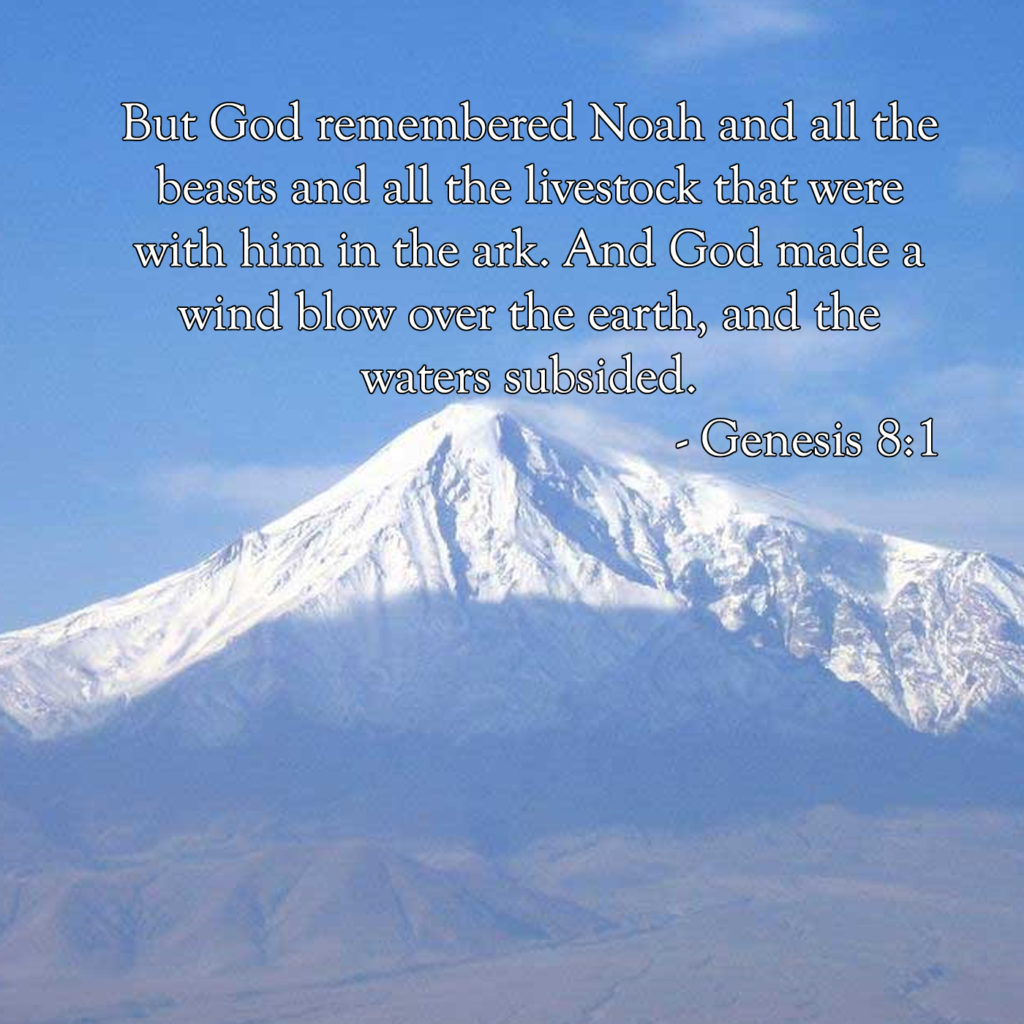
1 But God remembered Noah and all the beasts and all the livestock that were with him in the ark. And God made a wind blow over the earth, and the waters subsided.
God remembered Noah. In the original Hebrew, the word “remembered” could be understood as “turning His attention to.” God had completed His judgment, and now returns to focus on saving Noah, his family, and all of the animals that were spared.
2 The fountains of the deep and the windows of the heavens were closed, the rain from the heavens was restrained, 3 and the waters receded from the earth continually. At the end of 150 days the waters had abated, 4 and in the seventh month, on the seventeenth day of the month, the ark came to rest on the mountains of Ararat.
God ends the deluge, closing the underground springs, and keeping the rain from falling. After 150 days, as mentioned in the last chapter, the waters begin to recede. Five months to the day from when Noah entered the ark the ark comes to rest on Mount Ararat, in modern day Turkey.
5 And the waters continued to abate until the tenth month; in the tenth month, on the first day of the month, the tops of the mountains were seen.
It is another two and a half months after landing before they can see the mountain tops peaking above the water.
6 At the end of forty days Noah opened the window of the ark that he had made 7 and sent forth a raven. It went to and fro until the waters were dried up from the earth.
Noah waits 40 days, a reflection of the 40 days of rain to send a raven to see if the waters had fully subsided. Perhaps because of how the ark was situated on the mountain they did not have a good view of the land to see if it was dry. This raven would keep coming to the ark after flying around to see if the waters were dried up. It is likely that the raven, did not return willingly to Noah.
8 Then he sent forth a dove from him, to see if the waters had subsided from the face of the ground. 9 But the dove found no place to set her foot, and she returned to him to the ark, for the waters were still on the face of the whole earth. So he put out his hand and took her and brought her into the ark with him.
After the raven had apparently failed to fulfill its goal, Noah sends out a dove, a bird much more likely to return to him. This is the first mention of a dove in the Bible, and later doves will come to have special significance. However the dove does not find any place to land, and returned to Noah. It is likely that Noah would have examined the doves feet for mud, and did not find any.
10 He waited another seven days, and again he sent forth the dove out of the ark. 11 And the dove came back to him in the evening, and behold, in her mouth was a freshly plucked olive leaf. So Noah knew that the waters had subsided from the earth.
Noah waits a week before sending out the dove again. This time when the dove returns, it has a fresh olive leaf. This not only means that the waters are receding, but also that the plants are quickly growing or re-growing, perhaps miraculously.
12 Then he waited another seven days and sent forth the dove, and she did not return to him anymore.
The fact that dove does not return, especially when it was previously acting as a homing bird, is significant enough for Noah to prepare to open up the ark.
13 In the six hundred and first year, in the first month, the first day of the month, the waters were dried from off the earth. And Noah removed the covering of the ark and looked, and behold, the face of the ground was dry.
Once the dove doesn’t return, Noah removes the covering of the ark. This apparently takes place on his birthday. This gives him a better view, and he can see that the ground is dry. Many of the birds, and some of the animals that could climb would have likely left the ark at this point.
14 In the second month, on the twenty-seventh day of the month, the earth had dried out. 15 Then God said to Noah, 16 “Go out from the ark, you and your wife, and your sons and your sons’ wives with you. 17 Bring out with you every living thing that is with you of all flesh—birds and animals and every creeping thing that creeps on the earth—that they may swarm on the earth, and be fruitful and multiply on the earth.”
A full year and ten days after entering the ark, God gives Noah permission to leave the ark, and to take everything with them. Noah waited until God gave word, even when he could see that the earth was dry, he waited until God spoke.
God now repeats His command from the beginning, to be fruitful and multiply. This is in fact a new beginning.
18 So Noah went out, and his sons and his wife and his sons’ wives with him. 19 Every beast, every creeping thing, and every bird, everything that moves on the earth, went out by families from the ark.
Noah leaves the ark, only after receiving permission from God, and brings everyone and everything with them. From here they will spread out and repopulate the earth.
20 Then Noah built an altar to the LORD and took some of every clean animal and some of every clean bird and offered burnt offerings on the altar.
Noah likely used much of the wood from the ark for the altar. He sacrificed from the animals that he brought seven pairs of ,the seven pairs of clean animals. Even if he sacrificed six pairs of each, there would still be two of each to repopulate the earth. It is likely he didn’t kill that many so there were more than enough clean animals to, with God’s help, repopulate the earth.
21 And when the LORD smelled the pleasing aroma, the LORD said in his heart, “I will never again curse the ground because of man, for the intention of man’s heart is evil from his youth. Neither will I ever again strike down every living creature as I have done. 22 While the earth remains, seedtime and harvest, cold and heat, summer and winter, day and night, shall not cease.”
God promises to never curse the ground (as He did with Adam), nor will he entirely destroy all the Earth as long as it remains. This does not take away the possibility of final judgement, where God will save many in the New Earth while allowing the old one to pass away.
God speaks of the continuing corruption of humanity, even after His judgement. It is clear that even though this is a new beginning, mankind is still tainted by sin. Destroying mankind did not cleanse the world completely of sin.
